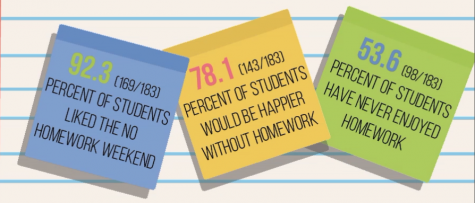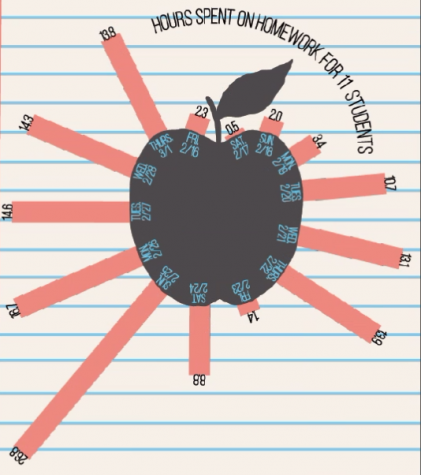Does homework work?
The sounds of celebration erupted from the group sitting in the crowded restaurant, but her brown eyes remained fixated on the paper in front of her. Esperanza Aguilar, junior, was surrounded by family one evening while out for dinner, but her mind persistently took her back to her current studies: math packet, psych quiz, English essay, engineering test. All due the next day. She suffered silently through the rest of dinner, tapping her foot, waiting until she could go home and finish the load of schoolwork that awaited her. When their car finally pulled into the driveway, she hopped out and went straight to her room for the rest of the night.
When all the work was done, she looked up at the clock. It read 2 a.m., and she realized her birthday was over. “I just wanted to relax and celebrate,” Aguilar said. “But the homework was always on my mind. So even though my homework is my responsibility, my family had to see my struggle, and see how exhausted I am.”
Aguilar’s experience is one of many that occurs within the KHS student body every single day, according to a recent TKC survey which found that 52 percent (94/182) of students spend more than two hours on homework each night. With that much work to complete on a daily basis, homework often tends to bleed into other activities, as 78 percent (142/182) of students have missed an extracurricular activity to complete homework. Similarly, 73 percent (132/182) of students have missed a meal with their family because of school work. Homework is preventing KHS students from fully participating in other activities, according to Aguilar and a majority of those surveyed. Aguilar said that considering the time commitment and mental toll it takes on many students, she does not believe most of her homework is necessary.
“It’s really the amount [of homework] that’s hurting students,” Aguilar said. “It’s necessary for certain classes, and it should be there for kids who need the reinforcement on the material. But it also should be optional.”
 all art by Sarah Nash
all art by Sarah Nash
Not only is the amount of homework a large time commitment for many students, but it may also be causing more serious problems for students’ well-being. An overwhelming 98 percent (180/183) of students said they would either be happier or less stressed if they had less homework. To add to that, 54 percent (98/183) of students said they have never enjoyed doing homework.
For Erika Muskopf, senior, this idea has mostly rung true. She said she can only think of a couple of times in her life where she has actually enjoyed homework, and said she can not remember a time she has been excited to do it. And it is the times where homework starts to consume her life, like when homework caused her to work late into the night the night before the ACT, that make her question if the current homework situation really works.
“There’s been times where the time frame to do [homework] is so short that it forces me to put my classes in order of least importance to most importance,” Muskopf said. “It’s stressful and not something I would ever want to do, but I’ve definitely had to do it before.”
According to Andy Butler, Washington University associate professor of education, students tend to have the most negative reaction to homework when they don’t know why they are doing it. In fact, 91 percent (167/183) of KHS students do not think all their homework is necessary. Butler said what many teachers and school administrations fail to understand is there are many ways to let students have independence and choice within a structure that still allows for curriculum requirements to be met.
“There are a lot of things we don’t do particularly well in education, and one of them is helping students find value in what they’re doing,” Butler said. “When [us teachers] give students homework, we don’t really ever tell them why they’re doing it.”
Butler said teachers have to make sure the assigned homework is not only relevant to the students, but can actually be completed by them in a way that increases their understanding. He also noted that flexibility is one of the most common things teachers fail to work into courses. Without these factors being accounted for, Butler said, a negative student reaction should be expected.
“There are a lot of times where kids at every level get homework that is kind of busy work,” Butler said. “A big part of the problem is that even if the homework is appropriate, the messaging around the homework is just not working. Students have to able to find the value in why they are being given homework rather than just being given it.”
Dr. Michael Havener, principal, said a lot of the homework related issues many students face boil down to issues with students balancing their busy schedules, not just pressure from teachers. If students aren’t managing their time well, they will put off assignments until the next night, or wait to start a long project until the end of the semester, Havener said. He said he is aware and understands this is a problem for many students. Havener also agreed with Butler that it is essential for students to see the value in their homework. He just believes students need to work harder to find the value that is already there.
“I think that the level of non-enjoyment is going to decrease if students realize their teachers are not just giving homework to give homework,” Havener said. “I don’t think teachers are doing it intentionally or in a mean spirit. I think they’re so passionate about their subject that they want that passion to roll over to their students.”
Havener said the administration began to intensely examine the homework problem two years ago, and has been able to make many conclusions since then that have influenced how the school has dealt with the issue. Havener stressed problems such as the high volume of homework students are given and a failure between students and teachers to compromise over completing curriculum material have not gone unnoticed, and that possible solutions are always being discussed.
“I like homework,” Havener said. “I understand the purpose of homework. The goal is not to get rid of homework. But right now, [homework] just feels like another layer of pressure or responsibility for many students. And so I think that the overloading of daily assignments is the main concern, as it [can] take away from the important things like eating dinner with your family.”
One solution that has come out of their discussions was the idea for ‘no homework weekends,’ which took place on the weekends of Feb. 16 and March 9. Havener said the idea was an effort to provide students with a break, mostly for the sake of their emotional and mental stability. 92 percent (169/183) of KHS students were in favor of the weekends, and Havener said a majority of teachers expressed their support to him as well. And while no further measures are being planned until after the success of the weekends can be assessed further, Havener said the results seem promising.
“Obviously, students are happy,” Havener said. “I had lots and lots of people, students and teachers, saying thank you. I even had parents saying thank you.”
Beyond the no homework weekends, Havener said the administration is unsure exactly what new improvements they can implement in terms of homework. He said KHS should always be open to trying new things, because the problem is far from resolved. Really, the fight to improve homework at KHS has only just begun.
Regardless of no homework weekends, Aguilar said homework is the main cause of stress in her life. Regardless of the value of the homework, she said there is just too much of it to handle. Regardless of curriculum requirements, she said something has to change. As soon as possible.
“The easy answer would be to just limit the homework, but exactly how we would do that is really hard to say,” Aguilar said. “But the amount of time it takes to complete is the single biggest problem with it. When it starts to take away from time with my family and things I enjoy, it’s a really big problem. It’s really bad, and something has to change.”
Your donation will support the student journalists of Kirkwood High School. Your contribution will allow us to purchase equipment and cover our annual website hosting costs.

Interests: I try to write something new every day, and read a new book every week. Classical music is >>>>>> everything. I play piano,...








